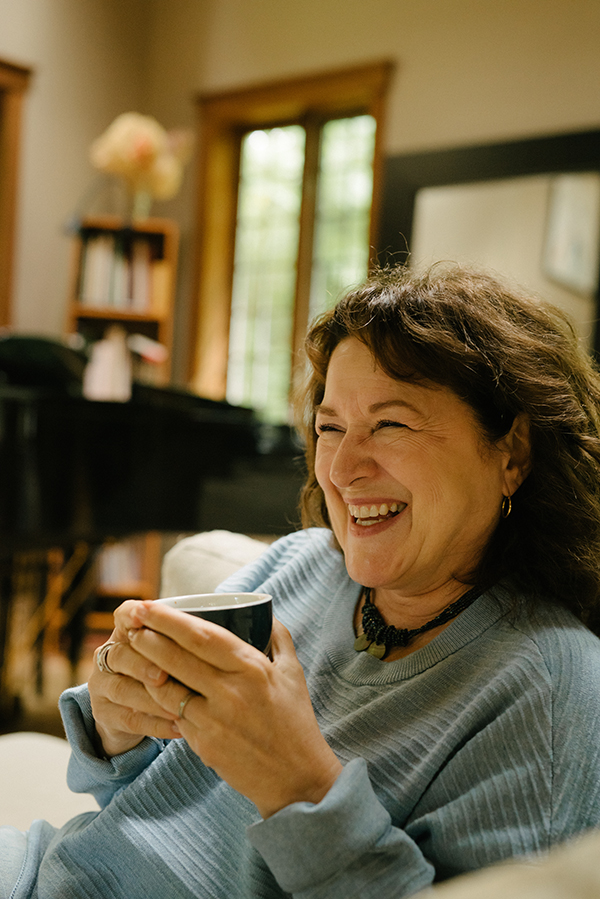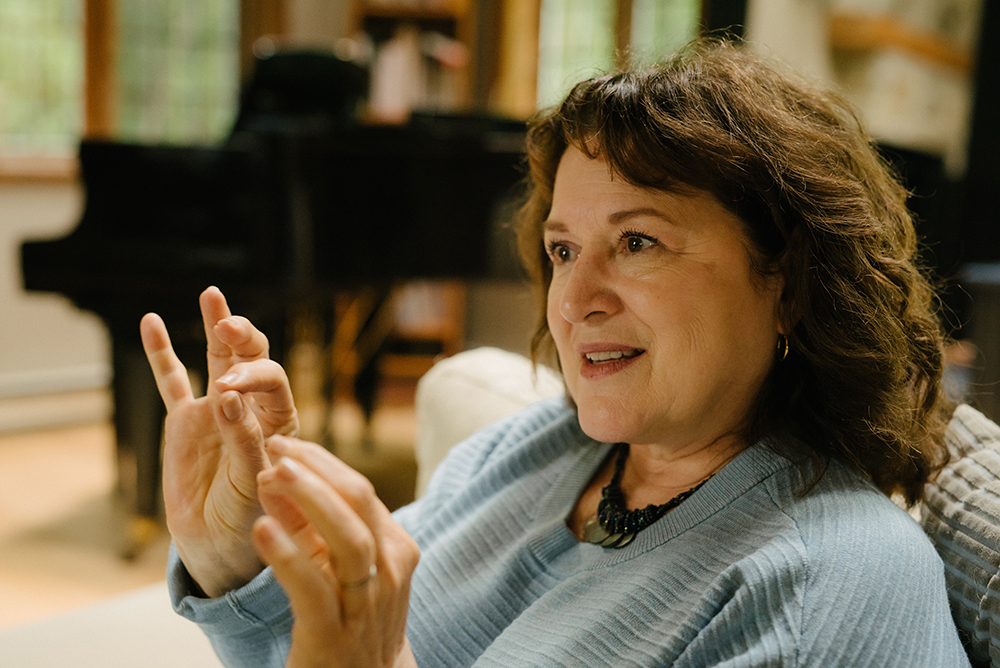Text : Véronique Gauthier
Photos : Marianne Charland
On a mild September afternoon, the Director of the Atelier lyrique de l’Opéra de Montréal Chantal Lambert greeted us at the door of her house in the country, located amid beautiful scenery and by a lake. The dwelling reflects it owner: warm, comforting, welcoming. Seated in her den, this singer and executive looked back with us on the fascinating journey that led to her becoming Director of the Atelier lyrique de l’Opéra de Montréal.
After more than 30 years of heading the program, guiding over a hundred young artists with soul and sensitivity, she is now getting ready to bow out. Her legacy and impact inside the walls of the Opéra de Montréal are palpable and indelible.
Predestined for music
Unaware of the influence she would one day impress upon the opera world in Montreal (and elsewhere), Chantal began developing her pedagogical and artistic proclivities at a very young age, nurtured by her parents who were schoolteachers and avid lovers of music and theatre. Music was played in the home from morning to night, her mother’s voice rang out enthusiastically, and the household’s four siblings divided their time between music, dance and theatre classes.
“My mother had designs for me when I was still in the womb. She had it figured out: “My first daughter will be named Chantal and she will sing.” My fate was sealed. Thank God I enjoyed it!” the soprano recounted with a smile.
From teaching to opera
In her youth, growing up in Lasalle, Chantal formed a band with her brother and friends, then joined a choir, the Ensemble vocal Arts-Québec. With no specific career goals, her heart was torn between theatre and music and she could well imagine becoming a teacher while continuing to sing Joni Mitchell songs. So she began her studies at UQÀM in education before entering the Conservatoire de musique de Montréal, urged by a very good friend, composer Silvio Palmieri, to give it a try.
“Quite honestly, when I began at the Conservatory, I did not have any high career aspirations. I mainly sang folk/pop music and vocal polyphony, and I wanted to develop strong proficiency at my instrument. I had no ambition whatsoever of becoming an artist of the opera stage! I had only been taking classical singing lessons for a few months, at that point.”
At the Conservatory, she gleefully received instruction from outstanding artists and educators that included tenor André Turp, pianist vocal coach Janine Lachance, and theatre director and performance coach Roland Laroche. And she discovered her great passion for opera. “I was really into it!” recalled Chantal. “I was very studious, and I thoroughly enjoyed my studies.” As years went by—she stayed eight years—she found herself singing spectacular solos with choir and orchestra.

The shock of early days with the Atelier lyrique
Immediately after her studies, in 1987, Chantal was accepted into the Atelier lyrique de l’Opéra de Montréal, which at the time, was in its 4th year of existence. Her arrival was not without its obstacles. “I was very reserved, I never had the ego or self-assurance of the ambitious young artist, and I found myself among singers with some very strong personalities. It took a big adjustment on my part.”
During this time, she made her debut with the Nouvelles Variétés Lyriques, performing the role of Métella in the operetta La Vie parisienne. It was truly a trial by fire for the young artist! Operetta subsequently became her favourite repertoire; it married her two passions of the stage—theatre and dance.
By this time a mother to a 14-month-old boy, the singer was also learning to calibrate a balance between family and professional life and soon realized that an international career would not fulfill her needs. “I took part in a competition abroad and I was just miserable because my son was going through important things and I wasn’t there with him. When I returned home, I decided I still wanted to sing, just not while espousing that kind of career.”
Through the looking glass
It was then that the Atelier offered her just the right opportunity: a coordination position—which quickly transformed into a directorship—enabling her not only to earn a living while remaining in Montreal, but also to continue to sing opera roles, all while supporting young singers in the early stages of their careers. “I discovered my keen interest in being a director, and I never left.”
Based on her personal experience, Chantal refused to compromise on one very specific thing during her many years at the helm of the Atelier: compassion. “Remembering how I felt when I arrived, that the ground was slipping out from under my feet, I knew that instilling a good dose of humanity in the program was essential. I like to believe that if I left any kind of mark on the Atelier, it was that.”
30 years of major developments
When she began her position and on throughout the ’90s, the atelier’s new manager was fortunate to be able to expand her opera role credentials while continuing her work with the Atelier lyrique. In the early aughts, her role as Director took the lead.
“It was around this time, when Bernard Labadie began as Artistic Director, that the Atelier lyrique productions started. Every year for 10 years, we collaborated with the production students at the National Theatre School and that was truly fantastic, even while it was financially trying. More recently, we added another dimension to these productions, since developing new operas is now in the mandate of the Atelier. It has brought a great richness to the experience of the stagiaire and our audiences.”

Patrick Corrigan: A strong ally for the Atelier lyrique
Such financial difficulties precluded any elbow room for the Director, as found in a report by Patrick Corrigan, before he was appointed General Director of the Opéra de Montréal. “Patrick had been mandated to give an evaluation of the program in 2014. We went in-depth with him into our reflections with and he was very impressed with our approach. His report could not have been more glowing! But he also pointed to a few shortcomings, mainly in the budget we needed just to be able to breathe and do a good job.”
When he took the reins of the Opéra de Montréal in 2016, Patrick Corrigan made her a promise. “He told me: “We're going to work together to chart a different program with its own model and make sure it becomes the number one choice for emerging artists.” And that’s what we’ve been doing ever since.”
The artist’s development at the core of a unique program
Among the elements that distinguish the Atelier lyrique de l’Opéra de Montréal from other programs for young artists is its mission to unlock each person’s uniqueness and develop their autonomy. The artists are empowered to do so via a discretionary budget according to their needs. Guidance in mental preparation for performances teaches them to better know and understand themselves and to work with where they are now to draw out the best of themselves.
“All of our reflections went in the direction of singularity. In a field such as ours, which is often likened to an Olympics of the voice, there is no other way to survive except to be 100% yourself. We do not try to fit young people into a mould, we professionalize them, we inspire them to show up with something different to contribute, to be self-determined. Young people who join the Atelier know that what they will find here is family, a 360-degree team, caring colleagues, food for thought, for the spirit, tools and resources to develop. The working atmosphere is unique, exceptional.”
A leader of quiet strength
Far from an authoritarian director, Chantal has been a gentle and reassuring presence for young people throughout her career. “I don’t want to be their mother, but I can be a colleague that is both rigorous and caring, and I am their best audience. They will certainly get no exacting critical review from me. I know all too well what it costs in guts and patience to be in this profession. When I see someone on the stage, their foibles don’t bother me so long as they are saying something, if they tell me a story. Singing comes with the responsibility of delivering a lyric. It isn’t singers with perfect technique whom I admire, it is those who disclose something to me, who dare to be vulnerable.”
The job of Director is one this artist has learned through experience over the years. “I never stopped learning, studying, searching, challenging myself. I always sought improvement, and I surrounded myself with people who have complementary qualities to fill in for certain facets that I have less of. I am proud to have gathered the team I always dreamed of! And the Atelier is now an integral part of the Opéra de Montréal, and that also is my reward.”
A smooth transition
Being able to combine performance work and directorial work while staying close to the people she loves all throughout her career is what Chantal is most grateful for. “I was given the best of both worlds. I was a program director, but also an artist and teacher and that’s very rewarding. All the hats that I wore fed off each other.”
Just as she was poised to bow out of the Atelier, the stage called to the soprano once again, and in 2020, she joined the production of Albertine en cinq temps—l’opéra, in the midst of the pandemic. More than giving a moving performance of the title role at 70 years old, she also collaborated in writing the libretto based on Michel Tremblay’s original play. It was a delight for someone who had scribbled in her notebook for years, without knowing what form this love of writing would one day take. “This project was truly a gift. When its director Nathalie Deschamps phoned me to offer me the role, I didn’t have to think twice—it was a yes!”
As this show hits the road over the next few months, Chantal’s impending retirement looms full of possibilities still unknown. “The collaboration with the wonderful women of Albertine showed me that I still have other avenues to explore. Retirement surely doesn’t have to be a kind of antechamber leading to death. I can be a scaredy-cat, by I try to let go and give life a chance to open other doors for me.”
Meanwhile the door of the Atelier will forever remain open to this woman who greatly impacted it with gentleness, lots of love and devotion. Her mark is an asset we will treasure for a long time to come.


